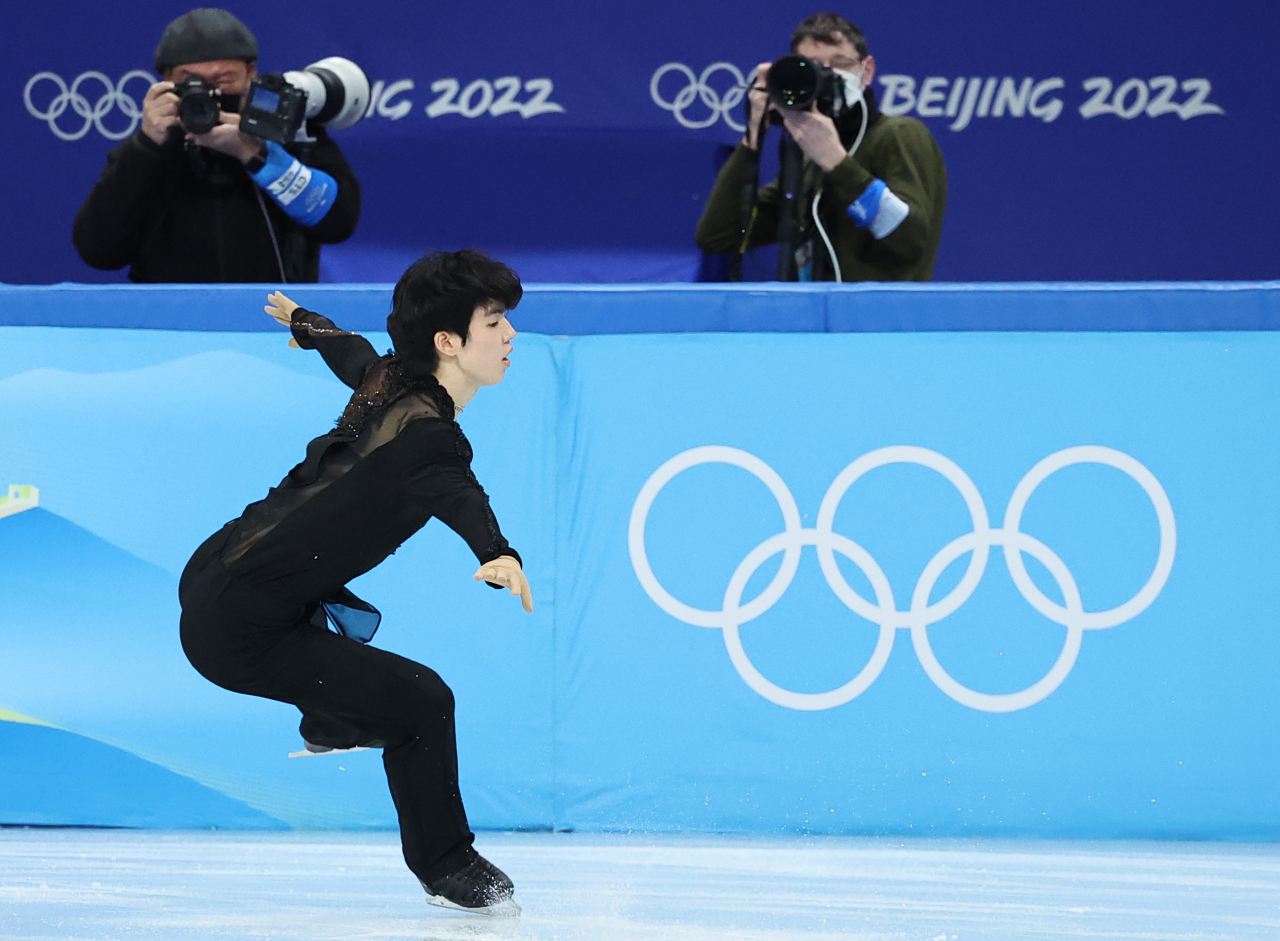
BEIJING -- In figure skating today, it's the numbers game that people play.
The current International Skating Union (ISU) judging system assigns points to technical elements in skaters' programs, such as jumps and spins. This is all designed to eliminate room for subjectivity in scoring, in response to some damaging judging scandals from the past.
Perhaps in an unintended side effect of this shift, figure skating has become increasingly more about jumps and less about artistry and choreography. If you execute more difficult jumps than other skaters, you will score more points. It's simple math.
And this is where South Korean figure skater Cha Jun-hwan finds himself, heading into the men's singles free skate at Beijing 2022 on Thursday.
Cha ranked fourth in Tuesday's short program with a new personal best score of 99.51 points. The three skaters ahead of him all scored over 100 points, including the leader, Nathan Chen of the United States, with 113.97 points.
Figure skating scores are divided into two sectors: the technical element score (TES) for jumps, spins and step sequences, and the program component score (PCS) for overall choreography, interpretation of music and transition between elements, among others.
Cha had 45.21 points in the PCS to Chen's 47.99. But Chen, a three-time world champion, handily beat Cha in the TES, 65.98 to 54.30.
It came down to numbers. Chen attempted two quadruple jumps -- a quad flip and a quad lutz in a combination with a triple toe loop -- while Cha had only one, a quad salchow.
The quadruple salchow has a base value of 9.70 points and a quad toe loop has 9.70 points in base score. Skaters can earn extra points in grade of execution (GOE) scores for clean executions.
The two Japanese skaters between Cha and Chen, Yuma Kagiyama and Shoma Uno, each attempted two quadruple jumps in the short program, too.
Chan landed his quad jump cleanly, but he simply cannot compete with those who attempt and land more quad jumps.
Cha earned 13.03 points for his quadruple salchow -- the base score plus GOE. Chen's quad flip had a base value of 11.00 points, and he picked up 4.40 in GOE, too.
This illustrates why Cha, though he sits about six points out of the bronze medal position held by Uno, will not likely narrow that gap in the free skate. If anything, he may fall even further back when it's all said and done.
Cha has already said he will attempt two quad jumps in his free skate -- a salchow and a toe loop. Chen, Kagiyama and Uno will all likely have four or five quadruple jumps in their program.
Then there's the two-time defending champion, Yuzuru Hanyu of Japan, lurking in eighth place after scoring just 95.15 points. He will attempt a quadruple axel, the most difficult quad jump that requires a four-and-a-half rotation on a forward takeoff. No one has successfully landed the quad axel in competition.
Not intimidated by his competition, Cha has insisted all along that he will focus on his own program and process, rather than the result. He has said if he puts on a clean performance, then the result will take care of itself.
Cha finished 15th in his Olympic debut at PyeongChang 2018. That was the best Olympic performance by a Korean male figure skater. He is poised to become the first man from the country to crack the top 10 in the Olympic men's singles competition.
And if he can somehow prevail in the numbers game against the sport's top technicians, Cha can jump into a whole new territory. (Yonhap)








![[Graphic News] More Koreans say they plan long-distance trips this year](http://res.heraldm.com/phpwas/restmb_idxmake.php?idx=644&simg=/content/image/2024/04/17/20240417050828_0.gif&u=)
![[KH Explains] Hyundai's full hybrid edge to pay off amid slow transition to pure EVs](http://res.heraldm.com/phpwas/restmb_idxmake.php?idx=644&simg=/content/image/2024/04/18/20240418050645_0.jpg&u=20240419100350)






![[From the Scene] Monks, Buddhists hail return of remains of Buddhas](http://res.heraldm.com/phpwas/restmb_idxmake.php?idx=652&simg=/content/image/2024/04/19/20240419050617_0.jpg&u=20240419175937)

![[KH Explains] Hyundai's full hybrid edge to pay off amid slow transition to pure EVs](http://res.heraldm.com/phpwas/restmb_idxmake.php?idx=652&simg=/content/image/2024/04/18/20240418050645_0.jpg&u=20240419100350)

![[Today’s K-pop] Illit drops debut single remix](http://res.heraldm.com/phpwas/restmb_idxmake.php?idx=642&simg=/content/image/2024/04/19/20240419050612_0.jpg&u=)